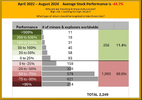- Joined
- 8 June 2008
- Posts
- 13,753
- Reactions
- 20,544
If it helps, link still did not work for me but i was able to search YouTube and getApologies for not responding to your posts and others. I have tried it again with VPN in several domains and without and it runs perfectly. It was posted while in Guernsey or Sark and works in the UK.
It should work if you click, 'watch on Youtube' which is on the screen.
Which i believe is the same, a couple of year old , video?
Thanks for your help/efforts





